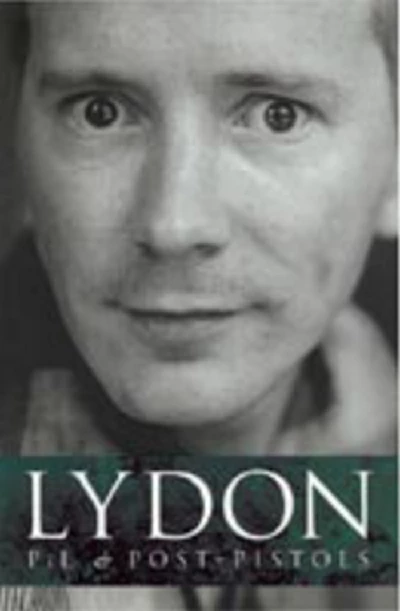Miscellaneous
-
The Sex Pistols, PIL and Anti-Celebrity
published: 12 /
10 /
2004

Long overdue, but heavily flawed account of John Lydon's life post the Sex Pistols and in PiL and beyond
Article
Most books about John Lydon start and end with the Sex Pistols in the 1970's. Jon Savage's authoritive 1990 account about the rise and fall of punk, 'England's Dreaming', concluded in early 1979 with the death of Sid Vicious. Lydon's own 1994 autobiography, 'Rotten : No Irish, No Blacks, No Dogs', didn't even get that far, finishing in mid 1978 with another untimely death, that of his own mother from cancer, just as he was starting out with his second band, Public Image Limited (PiL). 'John Lydon : The Sex Pistols, PiL and Anti-Celebrity', therefore, if nothing else, bridges a much needed gap, as, rather than just focusing on the first two years in Lydon's public life, which it skims over in a couple of pages, it concentrates instead on the last twenty five.
Its author Ben Myers, who is a freelance rock journalist, has done a perfunctory, if routine job on its research. In the book's appendix, he shows that he has read most of the hallmark books on punk , and that, as well as checking out some of the better established music websites such as www.allmusicguide.com and www.mtv.com, he has also worked his way through the relevant back editions of 'NME', 'Mojo', 'Q' and the now defunct 'Sounds.'
His book begins in Jamaica where Lydon went for two weeks in early 1978 after the unceremonious collapse of the Sex Pistols to scout out talent for Virgin subsiduary reggae record label, Frontline. Myers tells of Public Image limited's influential seven albums, and of Lydon's last recording to date, his underacknowledged 1997 solo debut, 'Psycho's Path'. He writes as well about Lydon's other career as a Californian property tycoon and the recent Sex Pistols reformation gigs, and concludes by telling of his shock return to the public arena as a contestant on the British reality TV game show, 'I'm a Celebrity, Get Me Out of Here.'
Where Myers begins to become unstuck, however, is in his lack of primary sources. He describes his book in a postscript at its end as "a personal and at the same time factual study sprinkled with the opinions of those whose lives he (Lydon) has touched upon." Lydon, Myers admits, turned down his request for an interview, and unfortunately elsewhere these sprinklings come very few and far between.
Keith Levene, whose distorted guitarwork had a massive bearing on PiL's first three albums including the seminal 'Metal Box', but who hasn't spoken to Lydon since 1986, makes the most important contributions. Beyond that there is Steve Vai, who did a day and half's session work on his 1986 record, 'Album', and the Prodigy's Liam Howlett, who once spoke to Lydon about using a sample of the Pistols 'New York' on a mix album. And that regrettably is about it. There is no Jah Wobble, whose rubbery bass work too had a strong influence on PIL's early sound. There is no Jeanette Lee either , PIL's seminal PR guru of the 80's ; no Bill Friswell, the band's latter day producer, and no Martin Atkins, who drummed for PIL off and on for six years. Other important players who have also collaborated in Lydon's musical history such as Afrika Bambaataa and Leftfield are all missing in their contributions as well
It is no secret that Lydon has always chosen his friends carefully. Perhaps the reason for this might be that there is such a closed circle around him that Myers simply found it impossible to get the scoops.
Myers, however, chooses to dress this up in rhetoric and with some guff about how Lydon has been such an anarchic influence on him that he decided to write his own unconventional and thus "personal" account of proceedings. He makes some vague ramblings at the beginning of the book about how Lydon encouraged him to think for himself. As the book , however, progresses, it never becomes clear exactly why or in what ways Myers, who was born in 1976, the same year as 'Anarchy in the UK' came out, and who was too young to live through most of either the Sex Pistols and PIL, feels that Lydon has been such a defining influence on him. He blows his case even further by admitting that those things he could have done like go to the Sex Pistols reformation gigs he didn't bother about because there "were smaller, better bands in clubs to go and see." Rather sulkily he finally also confesses that he doesn't need to and doesn't want to meet Lydon anyway.
For all his blustering and posturing, Myers comes across as someone who was never really that much of a fan in the first place. One is left wondering if Myers was cohesed into writing a book by his publisher about Lydon to cash in on his renewed status after 'I'm a Celebrity, Get me Out of Here' and once he realised that he wasn't going to get the breaks simply decided to try to blag his way out of things instead. Ultimately 'John Lydon : The Sex Pistols, PiL and Anti-Celebrity' lacks credibility. Lydon is such an elusive character that the definitive book about his years in PiL and beyond may never come, but this somewhat messy offering, while pulling together for the first time some of the until now otherwise disjointed strands in his post sex Pistols career, sadly isn't it.